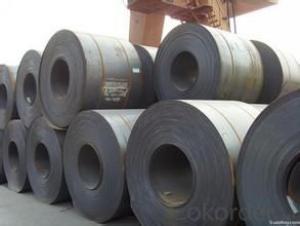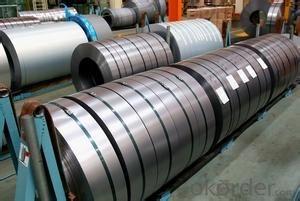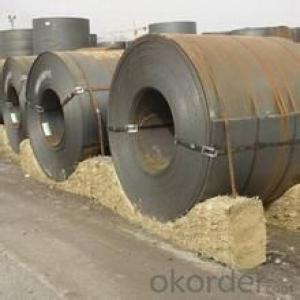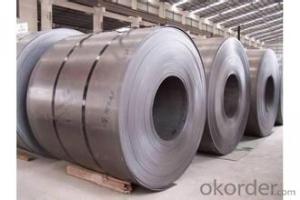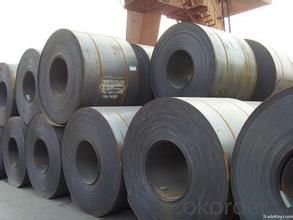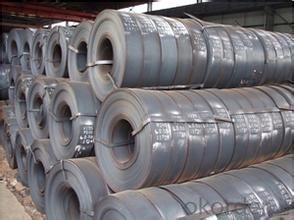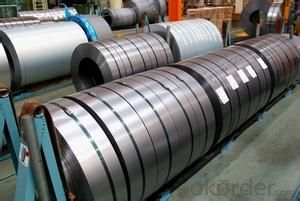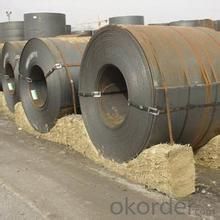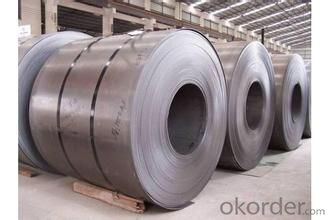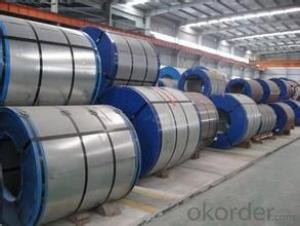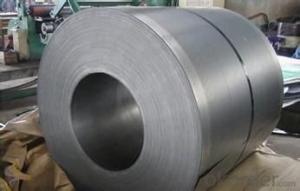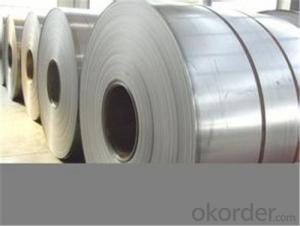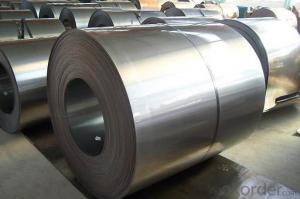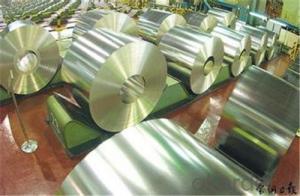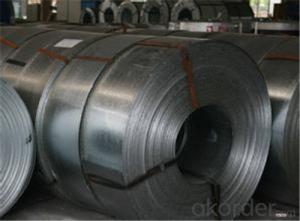Hot Rolled Steel Sheet Coils in Coil in CNBM
- Loading Port:
- Tianjin
- Payment Terms:
- TT OR LC
- Min Order Qty:
- 100 m.t.
- Supply Capability:
- 500000 m.t./month
OKorder Service Pledge
OKorder Financial Service
You Might Also Like
Rolled to its final dimensions while it’s hot enough to scale, our hot-rolled steel is an amalgamation of the various qualities of steel. It can be in the form of plates, sheets and coils. Our Hot-Rolled Steel Sheets and Coils are applied to a wide range of uses such as automobile, electrical appliance, machinery manufacturing container manufacturing, shipbuilding, bridge, pipeline, and receive high acclaim from our customers for its excellent quality.
Packaging & Delivery
| Packaging Detail: | shipment standard package |
| Delivery Detail: | within 15-20 days |
Hot-rolled Steel Plate St37-2
our company supply steel materials nine years,We're professional for various kinds steel plate .Our steel with high quality and competitive prices . short delivery time .Rich resources
Applications: Various types of steel components for riveting, bolting, welding.
Packaging & Delivery:
Packaging detail: Bundle, loose and bare or according customer inquire
Delivery detail: Depend on the customer inquire
Specifications:
Steel Plate ST37-2
1 Grade: ST37-2
2 T: 6-700mm; Length: 3000-12000mm; W: 1500-4000mm;
3 Delivery time: Average Period in 30 days
- Q: How do steel coils contribute to fire resistance in buildings?
- Steel coils contribute to fire resistance in buildings in several ways. Firstly, steel coils have high melting points, which means they can withstand extremely high temperatures without losing their structural integrity. This helps prevent the collapse of the building during a fire. Additionally, steel coils have low thermal conductivity, meaning they do not readily transfer heat. This property helps to contain the spread of fire, preventing it from spreading rapidly within the building. Moreover, steel coils can be used to reinforce concrete structures, enhancing their fire resistance. By providing strength and stability to the building, steel coils play a crucial role in ensuring the overall fire safety of the structure.
- Q: what happened to all the steel beams from the WTC buildings? did anyone do any forensic analysisof any of the steel?
- Some of the steel was recycled for sale to other countries where they aren't so picky about reusing building materials. NIST had 200 pieces of the steel for their investigation, which they returned last year. This was covered in the press. The rest of the steel was held at JFK international airport's Hangar 17. Much of it will be placed/has been placed in the new museum beneath the Memorial at the WTC site. Thousands of pieces are being given out for 9/11 memorials all over the world. Just about every day you read in the newspaper about another piece going here or there to this city or that city. Yes, a lot of the steel was tested for a number of chemical compounds. It had to be for safety reasons before storing it and giving it out. Depending upon what countries the recycled beams were sent to and their rules, it was sometimes tested at the ports of entry over there, as well.
- Q: Hello, Do I make any damage to my stainless steel sink by cleaning it with clorox? Thank you!
- Here okorder ... They suggest filling sink with 50/50 solution of water and bleach. Let soak for 15 minutes and then rinse well. Extended exposure to bleach may cause pitting. Lots of good advice at the site. Check it out. More advice on SSS care: 64.233.167.104/search?q=cache:YZS... DO NOT USE STEEL WOOL!
- Q: What are the challenges faced during steel coil processing?
- There are several challenges that can be encountered during steel coil processing. One of the main challenges is ensuring proper handling of the steel coils. Steel coils are heavy and can weigh several tons, so it is crucial to have the correct equipment and procedures in place to safely move and manipulate the coils. This includes using cranes, forklifts, or other lifting devices that are strong enough to handle the weight and size of the coils. Another challenge is maintaining the integrity of the steel coils during processing. Steel coils are susceptible to damage from scratches, dents, or other forms of physical deformation. It is important to have proper storage and handling procedures in place to minimize the risk of damage. Additionally, care must be taken during cutting, slitting, or other processing operations to ensure that the coils are not damaged or compromised. Quality control is another significant challenge in steel coil processing. It is essential to consistently produce coils that meet the required specifications, such as thickness, width, and surface quality. This requires meticulous inspection and monitoring throughout the entire processing chain, from receiving the raw material to the final product. Any deviations from the desired specifications can result in rejected coils or customer dissatisfaction. Efficiency and productivity are also challenges in steel coil processing. The processing operations need to be optimized to minimize waste, reduce downtime, and maximize throughput. This can involve implementing automation, improving production planning, and streamlining the workflow. Additionally, balancing the production speed with maintaining quality standards is crucial to ensure efficient and productive processing. Lastly, safety is a significant challenge in steel coil processing. The nature of the equipment and processes involved poses various risks to workers, including the potential for accidents, injuries, or exposure to harmful substances. It is vital to have proper safety protocols in place, provide adequate training to employees, and regularly inspect and maintain the equipment to ensure a safe working environment. In summary, the challenges faced during steel coil processing include handling the heavy coils, maintaining their integrity, ensuring quality control, optimizing efficiency and productivity, and ensuring a safe working environment. By addressing these challenges, steel coil processors can achieve smooth operations and deliver high-quality products to their customers.
- Q: doesnt steel rust?
- Stainless steel is regular steel that has had nickel added in the manufacturing process. Because of the nickel it prevents rust.
- Q: engineering sloutions related to steel fabrication
- not okorder /
- Q: How are steel coils used in the production of kitchenware?
- Steel coils are used in the production of kitchenware as they are unrolled and cut into specific shapes and sizes to form the base or body of various utensils like pots, pans, and trays. The coils are then shaped, molded, and welded to create the desired kitchenware products, which are further processed for surface finishing, such as polishing or coating, before being ready for use in households or commercial settings.
- Q: What is the maximum temperature steel coils can withstand?
- The maximum temperature that steel coils can withstand varies depending on the specific grade and type of steel being used. Steel is known for its high heat resistance and can typically withstand temperatures ranging from 550°C to 1,100°C (1,022°F to 2,012°F), depending on the grade. However, it is important to note that prolonged exposure to high temperatures can cause steel to lose its structural integrity and result in permanent deformation or even failure. Therefore, it is crucial to adhere to the manufacturer's guidelines and specifications when determining the maximum temperature that steel coils can withstand in specific applications.
- Q: How are steel coils distributed globally?
- Steel coils are distributed globally through various means such as shipping, rail, and truck transportation. They are typically transported in bulk quantities to steel processing plants, construction sites, and manufacturing facilities worldwide. Distribution channels and logistics networks play a crucial role in ensuring efficient and timely delivery of steel coils to meet the demands of different industries and markets across the globe.
- Q: I love the design! It looks great, is safe, and you can see through it just fine on camera. Do you like it?BQ: Old Blue WWF Steel Cage or the newer fence type steel cage?
- yes it is better now
Send your message to us
Hot Rolled Steel Sheet Coils in Coil in CNBM
- Loading Port:
- Tianjin
- Payment Terms:
- TT OR LC
- Min Order Qty:
- 100 m.t.
- Supply Capability:
- 500000 m.t./month
OKorder Service Pledge
OKorder Financial Service
Similar products
Hot products
Hot Searches
Related keywords
